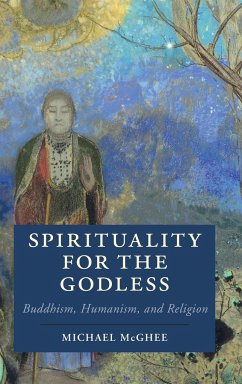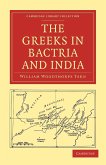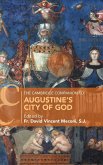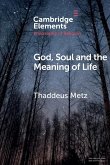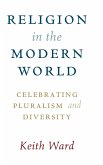Michael Mcghee
Spirituality for the Godless
Michael Mcghee
Spirituality for the Godless
- Gebundenes Buch
- Merkliste
- Auf die Merkliste
- Bewerten Bewerten
- Teilen
- Produkt teilen
- Produkterinnerung
- Produkterinnerung
A non-theistic contribution to the dialogue between religion and secular humanism through the medium of Buddhist spiritual practice.
Andere Kunden interessierten sich auch für
![The Greeks in Bactria and India The Greeks in Bactria and India]() William Woodthorpe TarnThe Greeks in Bactria and India68,99 €
William Woodthorpe TarnThe Greeks in Bactria and India68,99 €![The Cambridge Companion to Augustine's City of God The Cambridge Companion to Augustine's City of God]() The Cambridge Companion to Augustine's City of God101,99 €
The Cambridge Companion to Augustine's City of God101,99 €![God, Soul and the Meaning of Life God, Soul and the Meaning of Life]() Thaddeus MetzGod, Soul and the Meaning of Life22,99 €
Thaddeus MetzGod, Soul and the Meaning of Life22,99 €![Religion in the Modern World Religion in the Modern World]() Keith WardReligion in the Modern World106,99 €
Keith WardReligion in the Modern World106,99 €![God and the Problem of Epistemic Defeaters God and the Problem of Epistemic Defeaters]() Joshua ThurowGod and the Problem of Epistemic Defeaters61,99 €
Joshua ThurowGod and the Problem of Epistemic Defeaters61,99 €![Psychology, Religion, and Spirituality Psychology, Religion, and Spirituality]() Fraser WattsPsychology, Religion, and Spirituality34,99 €
Fraser WattsPsychology, Religion, and Spirituality34,99 €![Freud and the Legacy of Moses Freud and the Legacy of Moses]() Richard J. BernsteinFreud and the Legacy of Moses63,99 €
Richard J. BernsteinFreud and the Legacy of Moses63,99 €-
-
-
A non-theistic contribution to the dialogue between religion and secular humanism through the medium of Buddhist spiritual practice.
Produktdetails
- Produktdetails
- Verlag: Cambridge University Press
- Seitenzahl: 210
- Erscheinungstermin: 2. Juni 2021
- Englisch
- Abmessung: 235mm x 157mm x 17mm
- Gewicht: 499g
- ISBN-13: 9781107162013
- ISBN-10: 1107162017
- Artikelnr.: 60590610
- Herstellerkennzeichnung
- Libri GmbH
- Europaallee 1
- 36244 Bad Hersfeld
- gpsr@libri.de
- Verlag: Cambridge University Press
- Seitenzahl: 210
- Erscheinungstermin: 2. Juni 2021
- Englisch
- Abmessung: 235mm x 157mm x 17mm
- Gewicht: 499g
- ISBN-13: 9781107162013
- ISBN-10: 1107162017
- Artikelnr.: 60590610
- Herstellerkennzeichnung
- Libri GmbH
- Europaallee 1
- 36244 Bad Hersfeld
- gpsr@libri.de
Michael McGhee is Honorary Senior Fellow in the Department of Philosophy at the University of Liverpool. A British philosopher who was educated at a Roman Catholic seminary, he later became a practising Buddhist. He is the author of Transformations of Mind: Philosophy as Spiritual Practice (Cambridge University Press, 2000), editor and co-editor of various collections on philosophy and spirituality, and a founding editor of Contemporary Buddhism.
Acknowledgements
A Shakespearean Prologue: The Voice of Cordelian Ethics
1. Introduction
2. 'A Spiritually Enlightened Individual
3. The Resources of a Much Earlier Phase of the Tradition'
4. The Distractions of Baruch Spinoza
5. Immanuel Kant: 'To Regard as Petty what we are Otherwise Anxious About'
6. Wittgenstein's Cool Temple
7. Rilke, Shakespeare... and a Little Freud
8. Concealment and Revelation
9. Mindfulness and the Form of a Philosophical Life
10. Epictetus: 'The Beginning of Philosophy' ...
11. Ted Hughes: Evaporation, Translation, Translocation
12. Philosophy as an Inventive Convergence of Methods
13. Richard Norman: 'The Truths it Contains are Human Truths'
14. Perspectives: Marmalade Stains on the Breakfast Table
15. David Hume: Wanting the Natural Sentiments of Humanity
16. 'What is the Difference between Love and God's Love?'
17. 'Peace, Wild Wooddove, Shy Wings Shut'
18. 'Only a Little Snivelling Half-Wit Can Maintain That'
19. 'The World is Too Much With Us'
20. Of Self and Self, of Atman and Anatman
21. 'I am Myself Alone'
22. The Five Heaps or Skandhas
23.'We Claim that There is a Person, but we do not say that he is an Entity'
24. Birds, Frogs and Tintern Abbey
25. Human Resources and Hubris
References
Index.
A Shakespearean Prologue: The Voice of Cordelian Ethics
1. Introduction
2. 'A Spiritually Enlightened Individual
3. The Resources of a Much Earlier Phase of the Tradition'
4. The Distractions of Baruch Spinoza
5. Immanuel Kant: 'To Regard as Petty what we are Otherwise Anxious About'
6. Wittgenstein's Cool Temple
7. Rilke, Shakespeare... and a Little Freud
8. Concealment and Revelation
9. Mindfulness and the Form of a Philosophical Life
10. Epictetus: 'The Beginning of Philosophy' ...
11. Ted Hughes: Evaporation, Translation, Translocation
12. Philosophy as an Inventive Convergence of Methods
13. Richard Norman: 'The Truths it Contains are Human Truths'
14. Perspectives: Marmalade Stains on the Breakfast Table
15. David Hume: Wanting the Natural Sentiments of Humanity
16. 'What is the Difference between Love and God's Love?'
17. 'Peace, Wild Wooddove, Shy Wings Shut'
18. 'Only a Little Snivelling Half-Wit Can Maintain That'
19. 'The World is Too Much With Us'
20. Of Self and Self, of Atman and Anatman
21. 'I am Myself Alone'
22. The Five Heaps or Skandhas
23.'We Claim that There is a Person, but we do not say that he is an Entity'
24. Birds, Frogs and Tintern Abbey
25. Human Resources and Hubris
References
Index.
Acknowledgements
A Shakespearean Prologue: The Voice of Cordelian Ethics
1. Introduction
2. 'A Spiritually Enlightened Individual
3. The Resources of a Much Earlier Phase of the Tradition'
4. The Distractions of Baruch Spinoza
5. Immanuel Kant: 'To Regard as Petty what we are Otherwise Anxious About'
6. Wittgenstein's Cool Temple
7. Rilke, Shakespeare... and a Little Freud
8. Concealment and Revelation
9. Mindfulness and the Form of a Philosophical Life
10. Epictetus: 'The Beginning of Philosophy' ...
11. Ted Hughes: Evaporation, Translation, Translocation
12. Philosophy as an Inventive Convergence of Methods
13. Richard Norman: 'The Truths it Contains are Human Truths'
14. Perspectives: Marmalade Stains on the Breakfast Table
15. David Hume: Wanting the Natural Sentiments of Humanity
16. 'What is the Difference between Love and God's Love?'
17. 'Peace, Wild Wooddove, Shy Wings Shut'
18. 'Only a Little Snivelling Half-Wit Can Maintain That'
19. 'The World is Too Much With Us'
20. Of Self and Self, of Atman and Anatman
21. 'I am Myself Alone'
22. The Five Heaps or Skandhas
23.'We Claim that There is a Person, but we do not say that he is an Entity'
24. Birds, Frogs and Tintern Abbey
25. Human Resources and Hubris
References
Index.
A Shakespearean Prologue: The Voice of Cordelian Ethics
1. Introduction
2. 'A Spiritually Enlightened Individual
3. The Resources of a Much Earlier Phase of the Tradition'
4. The Distractions of Baruch Spinoza
5. Immanuel Kant: 'To Regard as Petty what we are Otherwise Anxious About'
6. Wittgenstein's Cool Temple
7. Rilke, Shakespeare... and a Little Freud
8. Concealment and Revelation
9. Mindfulness and the Form of a Philosophical Life
10. Epictetus: 'The Beginning of Philosophy' ...
11. Ted Hughes: Evaporation, Translation, Translocation
12. Philosophy as an Inventive Convergence of Methods
13. Richard Norman: 'The Truths it Contains are Human Truths'
14. Perspectives: Marmalade Stains on the Breakfast Table
15. David Hume: Wanting the Natural Sentiments of Humanity
16. 'What is the Difference between Love and God's Love?'
17. 'Peace, Wild Wooddove, Shy Wings Shut'
18. 'Only a Little Snivelling Half-Wit Can Maintain That'
19. 'The World is Too Much With Us'
20. Of Self and Self, of Atman and Anatman
21. 'I am Myself Alone'
22. The Five Heaps or Skandhas
23.'We Claim that There is a Person, but we do not say that he is an Entity'
24. Birds, Frogs and Tintern Abbey
25. Human Resources and Hubris
References
Index.

